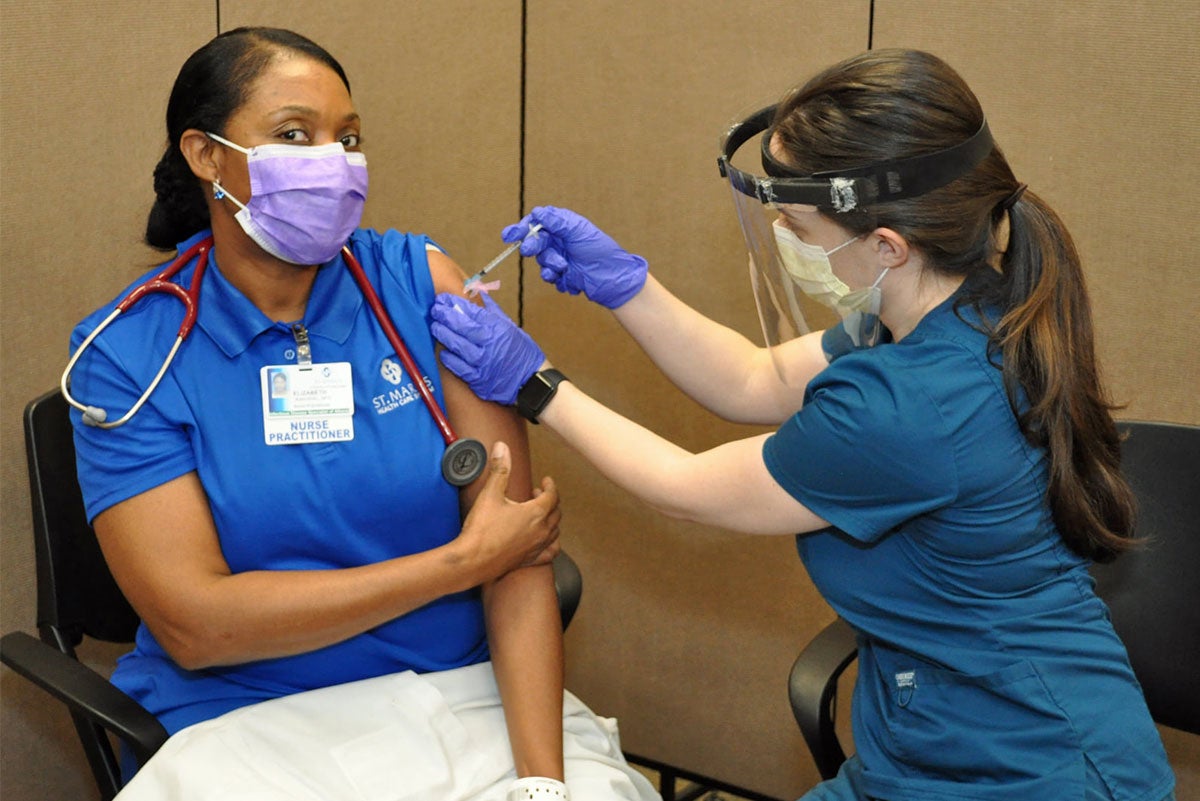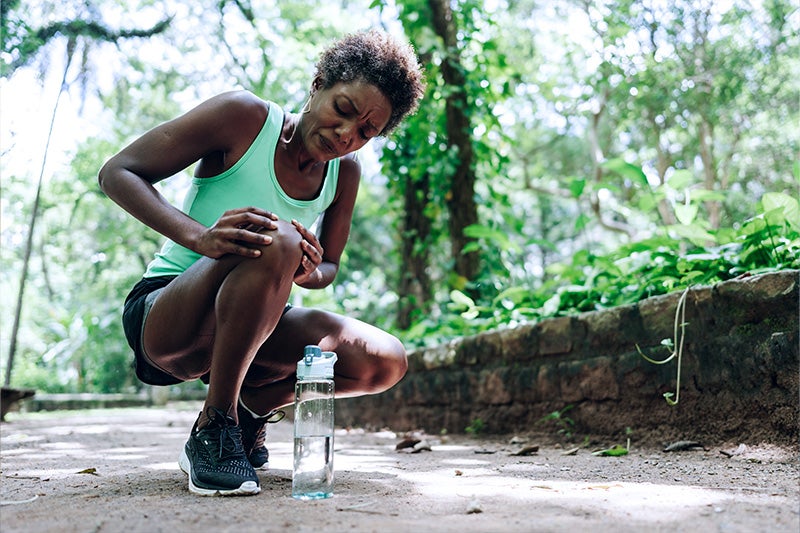Are All COVID-19 Vaccines Equally Safe and Effective?
March 10, 2021
By: Mark Ralston
Categories: COVID-19
Many people have asked if the Johnson & Johnson vaccine is as effective as the Pfizer and Moderna vaccines. We ask St. Mary’s Chief Medical Officer Dr. Jason Smith to explain the situation.
A Q&A with Dr. Jason Smith, Chief Medical Officer, St. Mary’s Health Care System
The recent FDA emergency use authorization of the Johnson & Johnson COVID-19 vaccine has the potential to bring a lot more vaccine to America – and the world – a lot sooner. And that could mean a faster end to the pandemic and return to safer, more normal living.
But many people have asked if the Johnson & Johnson vaccine is as effective as the Pfizer and Moderna vaccines approved in December. In this question-and-answer article, we ask St. Mary’s Chief Medical Officer Dr. Jason Smith to explain the situation.
Q: Why are some people worried about the effectiveness of the J&J vaccine?
It’s largely because of the headlines that the J&J vaccine is 72 percent effective at preventing COVID-19 infections, while the Pfizer and Moderna vaccines have been shown to be about 95 percent effective at preventing infections.
Q. Isn’t that a significant difference?
Not really. The important thing is that all three vaccines are nearly 100 percent effective at preventing severe illness and death. Studies reviewed by the FDA show people vaccinated with the Johnson & Johnson vaccine are just as safe against the worst effects of COVID-19 as people vaccinated with the other vaccines.
Q. What are some of the good features of the J&J vaccine?
1. From the provider’s perspective, it’s very helpful that it does not require ultra-cold storage. That means it eventually will be easier to distribute widely in settings like doctors’ offices and to homebound populations, like home health patients.
2. It requires only one shot instead of two, so people don’t have to schedule – and remember to get – their second dose.
3. Its authorization means we will have millions more doses of vaccine sooner than would have been possible with just the two previous vaccines, and that means our nation will be able to vaccinate millions of people more quickly.
Q. So, the bottom line is that the vaccines are essentially equally effective?
Exactly. The important thing is not which vaccine you get, it’s that you get vaccinated.
Q. Some people still question the safety of the COVID-19 vaccines. Are the vaccines safe?
They are amazingly safe. The mRNA technology used in the Pfizer and Moderna vaccines has been in development since the early 1990s. The vector technology used in the J&J vaccine has been in use for decades. All three have undergone rigorous testing with tens of thousands of study participants, and while the FDA streamlined its review process, there were no shortcuts in the testing process.
Q. Were the vaccines safely, ethically and thoroughly tested in minority populations?
Yes. The phase 3 clinical trials conducted by vaccine manufacturers included significant numbers of participants from the population groups most at risk for COVID-19. Pfizer included 44,000 participants: 81.4% White (26.2% Latino), 9% Black, 4.4% Asian. Moderna included 30,541 participants: 79.2% White (20.6% Latino), 10.3% Black, 4.3% Asian. The remainder in each trial consisted of Native America/Pacific Islander and multiple other races. Johnson and Johnson’s Phase 3 trial included 43,783 participants from three continents: 59% White (45% Latino), 19% Black, 9% Native American, 3% Asian.
Q. Does the Johnson & Johnson vaccine have different side effects from the other two?
No. All three vaccines can produce some mild side effects that typically resolve in 24-48 hours. The thing to understand about these side effects is that they are a sign the vaccine has stimulated your immune system, although they are effective even if you don’t develop the common side effects. Common side effects include soreness at the injection site, low fever, muscle aches, headache, chills and sometimes a rash. There have also been a few allergic reactions, which can happen with any kind of vaccine. That’s why we monitor people for 15-30 minutes after they get their shot.
Q. Can someone who has a history of allergic reactions to vaccines get the vaccine?
If you have a history of severe allergic reactions (anaphylaxis) to vaccines, such as the flu vaccine, talk with your doctor before receiving the COVID vaccine.
Q. Are the Pfizer, Moderna and Johnson & Johnson vaccines safe for people with egg or tree nut/peanut allergies?
The Pfizer, Moderna, and Johnson & Johnson vaccines do not contain egg or nut products so people with a history of egg or nut allergies should not be concerned about having a reaction.
Q. What level of immunity is obtained by either catching COVID-19 or receiving the vaccine?
The protection someone gains from having an infection, called natural immunity, varies depending on the disease, and it varies from person to person. Since this virus is new, it’s not yet known how long natural immunity might last. Some early evidence seems to suggest that natural immunity may last at least 6-8 months. Regarding vaccination, it’s also not known how long immunity will last and it won’t be known until more data is available. Both natural immunity and vaccine-induced immunity are important aspects of COVID-19 that experts are trying to learn more about. It is currently recommended that those who have recovered from acute COVID-19 illness be vaccinated, especially if more than 90 days have passed since diagnosis.
Q. What is herd immunity?
Herd immunity is when enough of a population has immunity against a disease that it can no longer spread. The herd-immunity threshold for coronavirus is not known. However, it is thought to be between 60 and 80 percent of the population. Herd immunity can be reached through vaccine immunization or through natural infection.
Q. Is it better to get immunity through infection or vaccination?
Vaccination. About 20% of people who catch COVID-19 experience severe symptoms, and some have strokes or damage to their lungs, heart or other organs that may never heal. In contrast, vaccination prevents the vast majority of infections and, so far, in those cases where vaccinated people have contracted COVID anyway, researchers have seen very, very few serious cases and no COVID-related deaths.
Q. How soon will most people be able to get vaccinated?
As of March 4, more than 90 million doses have been administered and nearly 31 million Americans have been fully vaccinated, out of a population of about 328 million. Demand is so high and the numbers are so large, the roll-out feels slow, but it’s actually going pretty fast. With Merck agreeing to help manufacture the Johnson & Johnson vaccine, and with Pfizer and Moderna at full speed, and with vaccines from other manufacturers potentially getting FDA emergency use authorization in the coming months, I’m optimistic we will see enough vaccinations by the end of summer to make a real difference in the transmission of the disease.
Q. How can I get vaccinated?
Supplies of vaccine are still limited, although the situation is improving. Currently, the best way to find a vaccine is to go to https://dph.georgia.gov/locations and follow the steps to get on a waiting list for the vaccine in your community. St. Mary’s is working to expand our vaccination efforts to the community, but we currently do not have enough supply to do so.
Q. What should people do in the meantime?
It’s vital that we stick to the tried-and-true methods of stopping the spread: wear a mask in public, maintain at least 6 feet of physical distance from people who don’t live in your household, avoid large gatherings, sanitize surfaces, and wash our hands frequently. I know we’re all tired of doing this, until enough people have been vaccinated to create herd immunity, new surges remain possible. We’ve got to keep our guard up.
Q. Any final thoughts about vaccination?
It doesn’t matter which vaccine you receive. The most important thing is to get vaccinated when it is your turn. Vaccination is the most effective way to end the COVID-19 pandemic and protect yourself and those you come in contact with.



